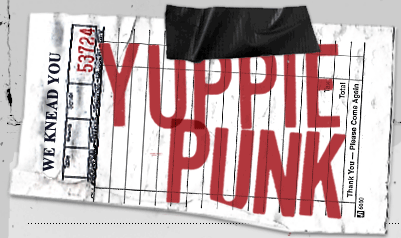Q&A: Virgil Dickerson of Suburban Home Records and Vinyl Collective

Virgil Dickerson is a busy dude. When he’s not running his indie label Suburban Home out of his Denver, Colorado office, he’s busy overseeing Vinyl Collective, the distro and online store he launched three years ago that specializes in — you guessed it — vinyl. And somewhere in between all that he also manages to make time for a wife and kid. Specializing in alt-country and tuneful punk rock, Suburban Home has released records from Drag the River, Useless I.D. and Tim Barry, lead singer of Avail. The label even has a Drunk Dial Hotline, a voicemail line that inebriated bands — and fans — are encouraged to call when they’ve had too much to drink, the highlights of which are posted on the labl’s website. We chatted with Dickerson about his two businesses, harnessing social media and the death of the label sampler.
Your label is named after a Descendents song, were they your entree to punk rock?
They weren’t my first experience with punk rock. I went to college in Boulder at C.U. in ‘93, and I was a big hip-hop guy leading up to that and never really latched on to too much rock. But the first bands I got exposed to were Screeching Weasel, Green Day and Operation Ivy. And that blew my mind. It opened me up to a whole other world that I knew nothing about. Shortly thereafter, I started thinking about doing a fanzine, and the name came up because of the Descendents song, who I became a big fan of. We were going to call the zine Suburban Homes and Gardens, but for whatever reason we decided to just make it Suburban Home. And that started in September of ‘95.
And when did you put out your first record?
I’d say the summer of ‘96. It was a band from Orange County called Overlap and it was a self-titled seven inch. They were a very Screeching Weasel-influenced pop-punk band. The second release was by a band called The Fairlanes, who were the ones who turned me on to all this music. Early on all we did was vinyl. We then put out a compilation called "Punk: It’s All About the Orchis Factor," which was a really stupid name. But we put out bands from all over and it actually had Blink-182 on it, who, at the time, were a really small band and were good buddies of ours. But later on that was the only reason the comp sold.
Punk rock compilations seem to have gone out of fashion. Labels just don’t seem to put them out like they used to.
I think that in 2009 music discovery happens on a whole other level. Back in the mid ’90s, I think people found out about other bands from compilations. If you were a fan of Fat Wreck Chords, you’d buy the cheapo comp they’d put out every year because you knew there was going to be new songs from upcoming records and you knew there was going to be new bands on there. But today you’ve got MySpace and Facebook and Twitter and all these other ways of finding bands that make compilations obsolete.
How then do you harness of all of those social media applications to your advantage?
We don’t really know what we’re doing, but we try a bunch of things. We’re on Twitter, we’re on Facebook, we’re on MySpace – one of the guys in our office created a streaming player that has an embeddable HTML code so that anybody who wants to share our music with people can embed it on their blog or MySpace page and help us share a full album stream by one of our artists. We’re always trying things. We’ve given away albums for free. We’ve done kind of everything under the sun with mixed results. And we’re always trying to do different things, but it’s an interesting time. There are so many neat ways to share music with people and spread what you’re doing, but on the flipside it’s so hard to reach out to people because everybody is getting bombarded by 50 million bands and songs and tours.
How many copies of something do you generally need to sell to pay back your investment? And how many copies does a good selling release do for you?
When we do vinyl on a title, we typically press about 500 or 1000 copies. If we can sell 300 or 400 of the 1000, we can usually make our money back on the pressing costs. And for a lot of our releases we’re able to do that no problem. As far as recouping the other expenses, like the recording costs and CD manufacturing, we’re having a really hard time selling CDs. I go back and forth about whether to even press CDs moving forward. Ideally I would just do vinyl and digital but I guess I’m not totally ready to throw in the towel on CDs yet. Breaking even on a record really depends on the recording costs or how much it costs to press the packages. As far as a good selling release, Tim Barry’s last album, "Manchester," we’ve probably sold 5,000 copies between vinyl and CD.
And you still operate like a traditional label by paying for the recording costs, manufacturing, etc?
We try to do everything as simply as possible and we consider ourselves to be pretty artist-friendly. We do a 50/50 profit sharing model with all of our artists. So if we break even on a title we split everything 50/50. Tim Barry’s records recoup and he makes royalties, but nobody’s ready to retire off of what we’re making. If the artists work hard and get momentum from all the things they do, it’s potentially possible to make a little money.
You worked at Hopeless Records for a time. What were able to take away from that experience that you could bring to Suburban Home?
I started the zine in ‘95, the label in ‘96 and in ‘97 I went to work at Hopeless as their label manager where I got to see the inner workings of a pretty successful small independent label. At the time, they had 88 Fingers Louie who were doing well, Mustard Plug who were doing well. They had signed Against All Authority, and all of their releases were doing pretty solid numbers. I learned that bands need to be able to tour – that’s so important. I learned a lot about getting records to distributors and making sure that people know about your releases. They do such a good job and they’re still doing really well. It’s insane some of the success that they’ve had. I think they’re about to go gold on one of the Avenged Sevenfold albums — it’s at about 480,000 copies scanned. And they put out two or three Thrice albums before they signed to a major. And they have a band now, All Time Low, a pop-punk band, that they’re expecting to be a big record. So I learned a lot there. I mean I only worked there for a year but I’ve been doing the label full time since returning.
How many employees to you have?
Six full time and one intern. If it were just a label it would probably only be me, but we also run Vinyl Collective, which is a lot more successful than the label.
And Vinyl Collective is a distro?
It’s a vinyl-only online store and we also license records from labels that aren’t putting out vinyl. With Vinyl Collective we put out the most recent Minus the Bear album, a bunch of Every Time I Die albums. We put out a few Portugal the Man records. Basically a bunch of bands that are bigger than our label could work with and we’ve put them out on vinyl and done really well with those titles.
What are the biggest challenges that you face in these businesses?
One of the biggest challenges is that the brick and mortal physical distribution is a broken business model. It really favors the big distributors. The problem is a lot of distributors will take a lot of copies with no care in the world whether they sell through or not. One of the biggest problems is that we end up manufacturing so many CDs for releases that never really had demand. Tower Records would take like 600 copies and then return them all. I have a whole storage space of dusty CDs. One reason we have focused our attention directly on our customers is that there are no returns. We’re a small label so maybe a lot of retailers will carry our titles when they’re a new release but then there’s not enough of a demand to always keep them in stock. So we focus a lot of our efforts directly on the music fans hoping that they’ll buy directly from us and then come back and buy the next record from us.
What records are you enjoying most at the moment?
There’s a band called which is like the newest incarnation of Simon & Garfunkel. It’s just a really good folk-pop record. There’s a band called from Richmond, Virginia and they’re a really great Americana-influenced punk rock band. They kind of remind me of the early Gaslight Anthem stuff. And Portugal the Man, a band we work with on vinyl – their new album comes out July 21st on Equal Vision — and that’s my favorite record of the year. I’ve been listening to it for a while now and it’s phenomenal.
Can one be both a yuppie and a punk?
I feel like I straddle that line. My wife and I enjoy good food and nice things but I think that for me, if I don’t look like your quote unquote punk, I’ve learned a lot of values from the DIY ethics that I’ll carry with me forever even if someone looks at me and says, "Oh, that guy’s a yuppie!"
RELATED: Q&A: Mike Park of Asian Man Records | Q&A: Davey von Bohlen of Maritime






